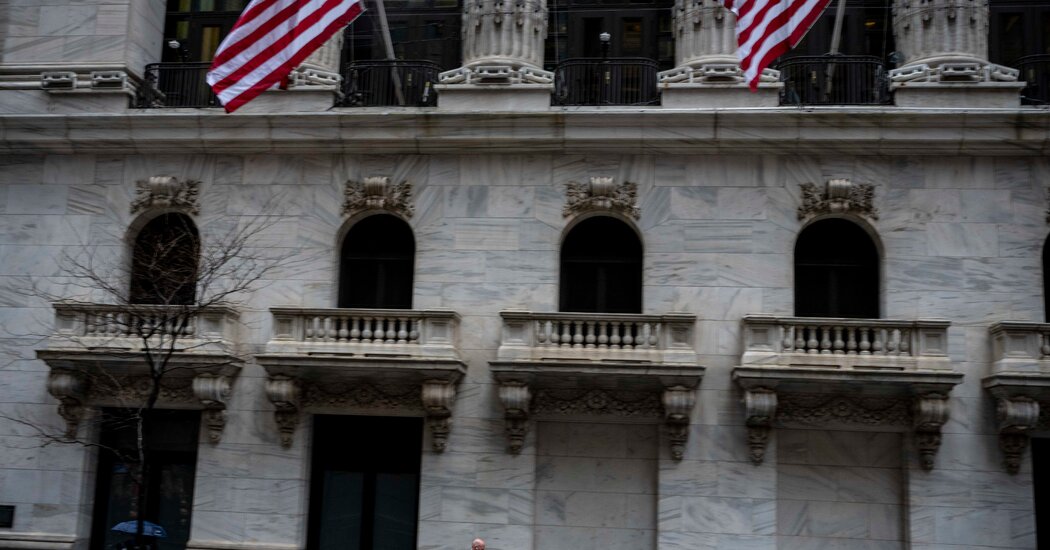After three days of global market turmoil not seen since the early days of the Covid-19 pandemic, stocks regained a measure of calm on Tuesday despite little letup in the escalating trade tensions caused by President Trump’s tariffs.
The S&P 500 posted a big gain at the open of trading, but the rally steadily faded and the index wavered between small gains and losses in the afternoon. The moves came after a brutal three-day slide that pulled the benchmark close to a bear market, or a drop of 20 percent or more from its recent high. The index remains nearly 18 percent below its mid-February record, having tumbled more than 10 percent in the days since Mr. Trump announced sweeping tariffs on major U.S. partners last week.
On Tuesday, investors seemed to take solace in signs that Washington may be open for negotiations on tariffs. Mr. Trump said on social media that he had spoken with the acting president of South Korea and “things are looking good” after the two discussed tariffs and other issues. But a strong early rally for U.S. stocks faded in the afternoon.
Markets around the world were unmoored last week by Mr. Trump’s announcement of broad new tariffs — a base tax of 10 percent on American imports, as well as significantly higher rates on goods from dozens of other countries set to take effect on Wednesday. Countries have responded with tariffs of their own on U.S. goods, or with threats of retaliation. China retaliated forcefully on Friday, matching a new 34 percent tariff with one of its own on many American imports.
Before markets opened in China on Tuesday, the government unleashed a series of measures to stabilize stocks. In turn, share prices in Hong Kong, a day after plunging 13.2 percent, and in mainland China jumped about 1.5 percent.
Stocks in Japan gained 6 percent, recouping a portion of the previous days’ losses. Markets in Taiwan continued to drop on Tuesday, and after the close of trading the finance ministry there said it would activate a $15 billion stabilization fund to steady the markets.
The Stoxx Europe 600 gained 2.7 percent, with nearly every major market in the region in the green. Stéphane Boujnah, the chief executive of Euronext, which runs several stock exchanges across Europe, said in an interview on French radio that the disruption caused by tariffs had made the U.S. markets “unrecognizable” to investors, who were shifting some of their money to Europe from the United States.
Business leaders and analysts are growing increasingly worried that escalating trade tensions could do lasting damage to the global economy, and some economists are already forecasting that the economy will slip into recession later this year.
Jane Fraser, the chief executive of Citigroup, said in a memo to employees on Tuesday that she spent last week in Washington and Monday in Mexico “where conversations on the ground are centered on the urgency of the moment.” Although tariffs may eventually be negotiated lower, she said in the note seen by The New York Times, “we should prepare for a fundamental shift in trade and capital flows.”
A survey of small businesses in the United States recorded a decline in confidence for a third straight month, with the share of business owners expecting conditions to improve falling the most since late 2020.
Economic growth worries have been reflected in other markets, notably in the price of oil. Brent crude, the international benchmark, continued to slide on Tuesday, trading at around $63 a barrel; it was above $80 a barrel three months ago.
The 10.5 percent drop in the S&P 500 on Thursday and Friday was the worst two-day decline for the index since the onset of the coronavirus pandemic in 2020.
On Monday, Mr. Trump issued a new ultimatum to China to rescind its retaliatory tariffs on U.S. goods, or face additional tariffs of 50 percent beginning Wednesday. And Scott Bessent, the U.S. Treasury secretary, said in a CNBC interview on Tuesday that China was making “a big mistake” and playing a “losing hand.”
But China is not relenting.
Several government departments and government-owned enterprises pledged to “maintain the smooth operation of the capital market.” And the People’s Bank of China, the country’s central bank, vowed to support Central Huijin Investment, the arm of China’s sovereign wealth fund that said it was increasing its holdings of stock funds.
In addition, dozens of companies, many of which are owned by the government, announced that they were buying back some of their shares, a move that typically lifts stock prices.
It remains to be seen how effective Beijing’s actions will be. The meltdown in Chinese markets a decade ago was driven by a sudden loss of confidence by investors, so propping up stocks helped calm nerves, said Zhiwu Chen, a professor of finance at the University of Hong Kong.
But Mr. Trump’s tariffs could inflict damage on China’s economy. “This time, it is much deeper than just market psychology,” Mr. Chen said.
Christopher Buckley, Amy Chang Chien, River Akira Davis, Rob Copeland, Alan Rappeport and Jason Karaian contributed reporting.
Joe Rennison writes about financial markets, a beat that ranges from chronicling the vagaries of the stock market to explaining the often-inscrutable trading decisions of Wall Street insiders.
Danielle Kaye is a business reporter and a 2024 David Carr Fellow, a program for journalists early in their careers.
Claire Fu covers China with a focus on business and social issues in the country. She is based in Seoul.
The post Markets Dip in Quieter Trading Even as Trade Tensions Escalate appeared first on New York Times.




